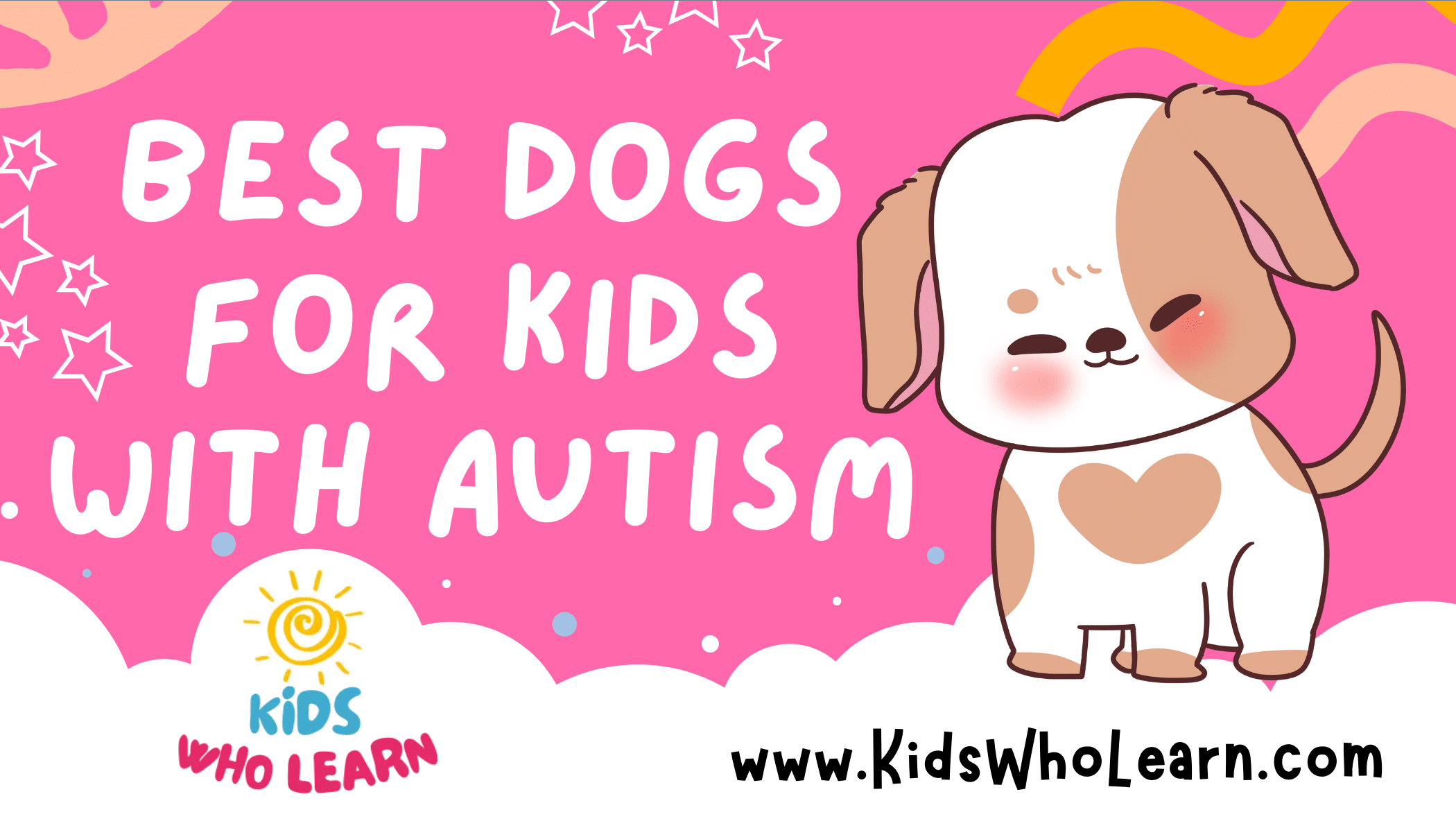Selecting a suitable dog for a child with autism can greatly enhance the child’s development and daily life. The unique qualities of dogs that make them ideal companions for children on the autism spectrum range from intuitive social cues to non-verbal communication. Canines can provide comfort, companionship, and a calming presence, which can be especially beneficial for an autistic child. It’s important to understand the needs of your child and consider how a dog might fulfill those needs, contribute to therapeutic goals, and fit into your family’s lifestyle.
The process of choosing the right dog involves evaluating the breed’s temperament, the individual dog’s personality, and the specific needs of your child with autism. Looking for traits like gentleness, a calm demeanor, and the ability to adapt to different situations will help pinpoint the best canine match. Additionally, preparing for the integration of a dog into your family requires thought about the space the dog will need, the time required for training, and the commitment to ongoing care.
Key Takeaways
- A well-chosen dog can provide numerous benefits for a child with autism.
- Breed temperament and individual personality are crucial in selecting the right dog.
- Integration and care planning are essential for a smooth transition.
Understanding Autism and the Role of Dogs
When considering autism spectrum disorder (ASD), you must recognize that it presents a wide range of challenges and differences, particularly in social skills, communication, and behavior. Children with autism may experience heightened sensitivities to stimuli, which can contribute to feelings of anxiety and stress. Your understanding of these aspects is crucial when introducing a service or therapy animal into their environment.
Dogs can offer exceptional companionship to autistic children, playing a unique role in providing comfort and a sense of steady familiarity. These animals can be trained specifically to assist with behavioral issues, helping to manage and often reduce the occurrence of meltdowns or self-harm behavior.
The interaction with a dog can also facilitate the development of social skills. For many children on the spectrum, engaging with a pet is less daunting than initiating communication with people. Dogs provide non-judgmental support, making it easier for some autistic children to practice and improve their communication abilities.
Dogs can serve as a calming presence, offering a way to regulate sensory overload, which is a common challenge for individuals with ASD. The presence of a dog can provide a tactile experience that is soothing, rather than overwhelming, for those with sensitivities.
Remember, the choice of dog should always consider the specific needs and preferences of the child. Some breeds may naturally be gentler and more patient with children, making them more suitable as companions for those with autism.
Traits of Dog Breeds Suitable for Kids with Autism
Selecting a dog breed that possesses certain traits can be particularly beneficial for children with autism. These qualities can help facilitate a supportive and therapeutic environment for your child.
Gentle and Patient
Breeds known for their gentle disposition and patience are ideal for interacting with kids who have autism. Golden Retrievers and Labrador Retrievers are prime examples, as they are typically calm and willing to tolerate repeated petting and interaction, which can provide a soothing experience for your child.
- Golden Retriever
- Gentle: Yes
- Patient: High
- Labrador Retriever
- Gentle: Yes
- Patient: High
Hypoallergenic and Easy to Train
If your child has sensitivities, hypoallergenic breeds like the Poodle or Soft Coated Wheaten Terrier can be suitable choices, reducing allergen exposure. These breeds also tend to be highly intelligent and easy to train, which is beneficial for ensuring obedience and cooperative behavior.
- Poodle
- Hypoallergenic: Yes
- Trainability: High
- Soft Coated Wheaten Terrier
- Hypoallergenic: Yes
- Trainability: High
Affectionate and Loyal
Breeds that demonstrate affectionate behavior and loyalty to their family members can make children with autism feel loved and secure. Beagles and Boxers are known for their affectionate nature and eagerness to form strong bonds.
- Beagle
- Affectionate: Yes
- Loyal: Yes
- Boxer
- Affectionate: Yes
- Loyal: Yes
Energetic and Playful
An appropriate energy level is important in a dog for keeping your child engaged. Breeds such as Border Collies and Australian Shepherds have a playful attitude and sufficient energy to participate in activities, which can help your child stay active and happy.
- Border Collie
- Energy Level: High
- Playful: Yes
- Australian Shepherd
- Energy Level: High
- Playful: Yes
Calm and Tolerant
A dog that remains calm and shows a high level of tolerance can be a reassuring presence for a child with autism. Cavalier King Charles Spaniels and Newfoundlands are breeds that typically exhibit a serene demeanor and an acceptance of various environmental stimuli.
- Cavalier King Charles Spaniel
- Calm: Yes
- Tolerant: Yes
- Newfoundland
- Calm: Yes
- Tolerant: High
Selecting the Right Dog for Your Child
Selecting a dog that will fit into your family and cater to your child’s specific needs is crucial. The right dog can offer comfort, companionship, and a unique bond that supports your child’s well-being.
Service Dogs
Service dogs are specifically trained to perform tasks for a person with a disability, including children with autism. Your child may benefit from a service dog if they need assistance with daily activities or require support for specific tasks.
- Breed Consideration: Some common service dog breeds include Labrador Retrievers, Golden Retrievers, and German Shepherds.
- Training: It’s vital to acquire a service dog through proper channels to ensure they are adequately trained for your child’s individual needs.
Therapy Dogs
Therapy dogs are trained to provide comfort and affection to various individuals. They are not like service dogs, which are tailored to one person’s needs, but can be a great asset in therapeutic settings.
- Purpose: A therapy dog might work well if your child is responsive to animals during therapy sessions.
- Environment: These dogs can visit various environments, such as schools or therapeutic centers, to aid in your child’s therapy.
Companion Dogs
Companion dogs are selected based on their temperament and ability to form a genuine companionship. They are not trained like service or therapy dogs but still offer significant emotional support through their presence.
- Traits: Look for a dog with a calm and gentle demeanor that can coexist peacefully with an autistic child.
- Interaction: A companion dog should be patient and intuitive to your child’s emotional state.
Emotional Support Dogs
An emotional support dog provides comfort and a sense of safety for your child. Unlike service dogs, they do not require specific task training.
- Documentation: You may need to register your dog as an emotional support animal depending on local regulations.
- Role: These dogs can help your child navigate emotional peaks and improve their daily functioning through presence and affection.
Family Dogs
A family dog is not just an animal but an integral member of the family that provides love and joy to all family members, including your child with autism.
- Consideration: Ensure that the dog has a suitable temperament that matches your family’s lifestyle and your child’s specific needs.
- Responsibility: Caring for a dog can teach your child valuable lessons about responsibility and caring for others.
Remember that with any type of dog you consider, your child’s safety and the dog’s well-being should always be priority. The development of a strong bond between your child and the dog hinges upon mutual understanding, respect, and proper training.
Top Dog Breeds for Children with Autism
Selecting the right dog breed is essential for benefiting a child with autism. These breeds are known for their gentle nature, trainability, and loyalty, making them excellent companions.
Golden Retriever
Temperament: Known for their friendly and tolerant attitude, Golden Retrievers are a top choice for families. They are particularly patient, which is crucial for kids requiring a gentler companion.
Suitability: Their intuitive nature helps them connect with children on the spectrum, providing comfort and support.
Labrador Retriever
Temperament: Labrador Retrievers are renowned for their gentle disposition and steady temperament, making them a dependable choice for your child.
Suitability: Their high trainability allows them to be excellent service dogs, particularly for individuals with special needs.
Poodle
Temperament: Poodles stand out with their intelligence and ease of training. They are often good-natured and eager to please.
Suitability: This breed comes in various sizes to suit your living space and is known for its hypoallergenic coat, which is beneficial for children with sensitivities.
Labradoodle
Temperament: Labradoodles combine the Labrador’s friendliness with the Poodle’s smart, low-shedding traits.
Suitability: This mix makes them ideal family pets, especially in households where allergies may be a concern.
Goldendoodle
Temperament: Goldendoodles are a mix of Golden Retriever and Poodle, inheriting the affectionate and intelligent qualities of both breeds.
Suitability: They are adaptable and often used in therapeutic settings for their empathetic nature.
Newfoundland
Temperament: Newfoundlands are gentle giants known for their calm and docile nature. They are deeply loyal and protective of their family members.
Suitability: Despite their large size, they are often good with children and can be particularly comforting due to their patient demeanor.
Saint Bernard
Temperament: Saint Bernards are friendly and welcoming. They have a watchful and caring nature.
Suitability: These dogs are great for children who benefit from a large, reassuring presence.
Bernese Mountain Dog
Temperament: The Bernese Mountain Dog is known for its affectionate character and strong loyalty to family members.
Suitability: Their calm and patient temperament makes them well-suited as companions for children with autism.
Collie
Temperament: Collies are sensitive and intelligent, often able to anticipate their owner’s needs.
Suitability: Their responsive nature makes them particularly good for children who require attentive companionship.
German Shepherd
Temperament: German Shepherds are immensely loyal and have a high capacity for learning and following commands.
Suitability: Their protective instincts and steady nature can be beneficial for families seeking a confident and watchful friend for their child.
Training and Caring for Your Dog
Training and caring for your dog is a critical process that ensures safety and well-being for both the child with autism and the dog. A well-trained dog can serve as a social catalyst, a disciplined companion, and even a protector under the right circumstances.
Behavioral Training
- Basic Commands: Start with fundamental commands such as sit, stay, come, and heel to establish basic discipline and structure.
- Consistency: Be consistent with commands and rewards to reinforce good behavior.
Specialized Training
- Service Dogs: Dogs can undergo specialized training to become service dogs, specifically catering to the needs of children with autism.
- Skills: This training includes recognizing distress signs, providing calming pressure, and preventing the child from wandering.
Health and Maintenance
- Regular Check-ups: Schedule regular veterinary check-ups to maintain your dog’s health.
- Diet and Exercise: Ensure a balanced diet and regular exercise to keep them physically fit.
Socialization and Interaction
- Safe Spaces: Create safe, private spaces for the dog to retreat to when overwhelmed.
- Security Focus: As a protector of your child, the dog should be socialized in a way that balances friendliness with an appropriate level of private security.
Integrating a Dog into Your Family
Choosing the right family dog involves creating a nurturing bond between your child with autism and the pet, establishing consistent routines, and ensuring your home provides a supportive environment.
Building a Strong Bond
A loyal and empathetic family dog can offer your child unconditional love and companionship, fostering a strong bond that is essential for your child’s well-being. To cultivate this relationship:
- Interact daily: Set aside time each day for your child and the dog to interact, aiding in the development of trust.
- Participate in care: Encourage your child to partake in feeding and grooming to strengthen their connection with the dog.
Establishing Routines
Children with autism often thrive on routine, and a family dog can benefit from this structure as well. Implementing a daily schedule helps both your child and your dog know what to expect:
- Feeding: Outline specific times for meals.
- Walking: Schedule regular walks to promote exercise and social interaction.
Ensuring a Supportive Environment
The environment you create for your dog should be safe and conducive to forming a positive relationship:
- Designate spaces: Have clear areas in your home where the dog is allowed to relax and where it eats and sleeps.
- Familiarize with autism service dogs: If your dog is an Autism Service Dogs of America trainee, ensure a suitable environment for advanced training and support tasks.
By attending to these details, you actively support the growth of a loving bond that can deeply enhance your family’s dynamics.
Additional Considerations
When considering a support dog for a child with autism, it’s important to understand the legal and ethical aspects involved, as well as the financial implications of such a commitment.
Legal and Ethical Aspects
When you’re adopting a support dog for your child with autism, familiarize yourself with the legal definition and rights provided to support animals. Organizations like Paws with a Cause can provide you with guidelines on how support dogs should be trained and handled. Here are some key points:
- Training Standards: Support dogs must be properly trained to assist with specific tasks related to an individual’s disability.
- Public Access Rights: Under the Americans with Disabilities Act (ADA), support dogs are allowed in most public places.
Remember, while support animals have legal rights, it’s also your ethical responsibility to ensure the dog’s welfare and that it is not disruptive or a burden in public settings.
Financial Implications
The financial aspect of owning a support dog is multifaceted. Here’s a simplified breakdown to help you plan:
| Expense Category | Description |
|---|---|
| Initial Adoption | May include fees from shelters or breeders. |
| Training Costs | Specialized training for support dogs can be substantial. |
| Veterinary Care | Regular check-ups, vaccinations, and any unforeseen health issues. |
| Daily Care | Includes food, grooming, and accessories like leashes and beds. |
Organizations such as Paws with a Cause may offer assistance with some costs, but you should anticipate ongoing expenses for the lifetime of the dog. Budgeting for these expenses is crucial to ensure that the dog can continue providing support for years to come.
Frequently Asked Questions
Selecting the right dog for a child with autism requires careful consideration of the animal’s temperament, energy level, and compatibility with your child.
What are the most recommended dog breeds for children with autism?
The most recommended dog breeds for children with autism include the Golden Retriever, Labrador Retriever, and the Poodle. These breeds are known for their gentle demeanor, loyalty, and trainable nature.
What characteristics should a dog have to be suited for a child with autism?
A dog suited for a child with autism should exhibit qualities like a calm disposition, a predictable temperament, patience, and a moderate energy level. These traits can help provide a comforting and stable companion for a child with autism.
How does the presence of a dog benefit a child with autism?
The presence of a dog can offer emotional support to a child with autism, helping to reduce anxiety, facilitate social interactions, and provide a sense of security. Dogs can also promote responsibility and routine through their care needs.
What should be considered when choosing a dog for a family with an autistic child?
When choosing a dog for a family with an autistic child, take into account your child’s sensitivity to noise, their need for personal space, the dog’s size, energy level, and the amount of care the dog requires. Matching these factors to your family’s lifestyle and your child’s needs is crucial.
Can service dogs be trained to assist children with high functioning autism?
Yes, service dogs can be trained to assist children with high functioning autism. They can be taught specific tasks to support a child’s unique challenges, such as interrupting repetitive behaviors or guiding a child away from stressful situations.
What hypoallergenic dog breeds are well-suited for families concerned with autism and allergies?
Hypoallergenic dog breeds that are well-suited for families with concerns about autism and allergies include the Bichon Frise, Schnauzer, and Soft Coated Wheaten Terrier. These breeds typically shed less and produce fewer allergens, making them a suitable choice for sensitive environments.









